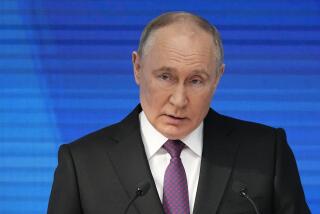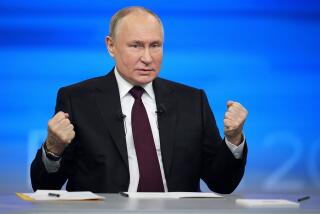Gorbachev Calls on Citizens to Save the Union : Soviet crisis: The fate of the nation, he says in a somber message, will be decided in ‘extraordinary’ months ahead.
- Share via
MOSCOW — With the Soviet Union facing one of the toughest years in its history, President Mikhail S. Gorbachev called on citizens Monday to unite and bring the country out of its deepening crisis.
The fate of the nation, both as a political and economic system and as a cohesive state, will be decided in 1991, Gorbachev said, and all his reforms, past and future, will also be at stake.
In a somber New Year message, broadcast to the nation just before midnight in Moscow, Gorbachev offered only the slightest hope that the Soviet Union would emerge soon from its multiple crises--political, economic and ethnic.
“This coming year will be an extraordinary one,” he said, “for next year the decision will be made on the fate of our multinational state. For all of us Soviet people, there is nothing more sacred than the preservation and renewal of the union, where all people could live freely and contentedly. . . .
“We may now feel more acutely than ever that we should not live separated from one another. To overcome the crisis, to stand on our feet, to proceed solidly on the course of renewal, we can only be together. The union, preserved and renewed, is the key to solving the giant and fateful tasks we will be facing in 1991.”
Yet, with a national referendum planned early this year on the continued existence of the Soviet Union as a federal state, unity itself is an issue.
Fierce nationalism has swept the Soviet Union in the last year, putting in question the country’s continued existence as it is now constituted. The three Baltic republics of Estonia, Latvia and Lithuania, as well as the southern republic of Georgia, want to secede, and that could bring the division of what remains--and perhaps widespread civil unrest.
At the same time, the Soviet economy is contracting at a rate estimated by independent economists at perhaps 8% this year and probably at 11% to 12% next year. Inflation is soaring--perhaps 80% a year when black-market prices for essential commodities are taken into account--and unemployment is rising.
The Soviet political system, despite its democratization under Gorbachev in the past five years, has been unable to cope with these issues, and this ineffectiveness has prompted calls, from both conservatives and radical reformers, for a “strong hand” to rule the country.
Describing the past year as “one of the most difficult in our history,” Gorbachev cited an economic crisis bad enough to lead to an international relief effort, ethnic clashes and a breakdown in everyday law and order. “We are seeing off a year that was extraordinarily difficult for all of us,” he said.
Struggling now to preserve the Soviet Union as a state, as well as for the success of his reforms, Gorbachev acknowledged that the leadership’s errors had made all these crises worse, but he asked for renewed support.
“However deep the country’s present crisis, we can and must achieve a breakthrough in the coming year,” Gorbachev said. “For this, however, we need a civil and inter-ethnic consensus, responsibility and discipline, conscientious work and plain humanity in our relations with one another.”
The only hope that Gorbachev could hold out was that the restructuring of the government, authorized last month by the national Parliament to strengthen his powers as president, would bring that breakthrough.
“Stabilization of the economy and the political situation is vitally important for the firm continuation of the movement forward on the way of democratic transformations, for the strengthening of order, legality and discipline and for protecting human rights,” Gorbachev said. “We will not give up this course.”
To Gorbachev’s critics on the left, however, that course is to the right. And the president did nothing in his brief address to dispel the common assessment here that perestroika, as his reforms are known, has turned conservative and veered rightward in an attempt to broaden support among Communist Party officials, military officials, government bureaucrats and the security police.
More to Read
Sign up for Essential California
The most important California stories and recommendations in your inbox every morning.
You may occasionally receive promotional content from the Los Angeles Times.













